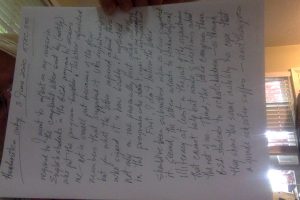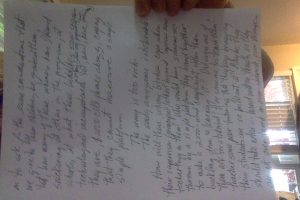

- Do you normally write by hand or type? Did you find this task difficult or easy? Explain.
Generally, I use a computer, especially for assignments. I simply type much more quickly than I write, although perhaps less so as my computer keys begin to dim and wear and indiscriminately miss a bat (bat) (beat!) (at last) now and then . . . somewhat like me . . . lol
I love to write, though, and when I do, tend to infuse flourishes into my letters . . . sometimes creating print text that is sharp and edgy, now creating print text that swirls and curls . . . I spend rather a great deal of time on my shopping lists, imagining—after I’ve lost them enroute, as I always do—that someone will pick them up and wonder who has done this letter writing . . . and make a found poem of it all . . .
I would find it tedious to write papers by hand; I haven’t done that since high school . . . and a far-sighted undergraduate professor made all his students switch to computers to submit papers so I have been using that mode for 30-odd years. I don’t find it difficult to write, at all, and I use it to take notes for things I find important and want to be able to remember. I have always noticed that when I take physical notes, I recall more, and in more detail.
- What did you do when you made a mistake or wanted to change your writing? How did you edit your work?
It’s also still necessary to take notes by hand in some venues—such as a movie theatre, play or other live production, which I often do, so note-taking is something I enjoy, not dread . . . depending on the error, I may leave it, or draw a line through it. I rarely completely obliterate something I’ve hand written, and I tell my computer-loving students the same thing. Keep your iterations; save a new version. Things about the old version may be needed later and you’ll be glad to have kept them for reference.
I used to edit my handwritten work by cutting it out and placing it where I wanted it with gaps to fill in new material, if I needed it.
- Did your choice of media play a part in how you edited your work?
I almost always use my computer, but have used audio notes, at times, so I suppose the medium has played a role in the editing process.
- What do you feel is the most significant difference between writing by hand and using mechanized forms of writing? Which do you prefer and why?
Speed. Writing by hand slows thinking; it allows significant mental editing—requires it, really—before setting words on the page. It also slows energy; by that, I mean, when you are typing quickly at, say, 100 words/minute, twice or thrice the speed of writing, your thoughts can almost overwhelm you and your emotions can become caught up to the same frenetic pace as your typing.
Hand writing is an evolving process that slows the reification and immobilizing of mechanization, even as it imposes limits, order, priority on what can be written; it’s the nearest thing to presence (to point to Heidegger) when “being” is absent; hand writing to some degree captures the presence of the writer; typeset does not. This objectifies print, eventually gives it more authority and a sense of the ubiquity of any ‘truth’ the immobilized lettering might contain and certitude and credibility over handwritten materials that must always remain associated with one individual and person.
The whole idea of signification and the emptying of the signifier with the increased distance of the being from the production of significance is what an experiment with handwriting and increasingly distant forms of print illustrate. The issue of the eyes (“gaze”) that co-creates the handwriting is also a distinguishing factor from mechanized writing where the only eye that watches the production is, arguably, the eye of the machine.
This experiment reminds me of where ‘writing’ and language originate: outside the signifier. Yet, we often take writing and language as what signifies, which isn’t true. The “being” that philosophers like Heidegger, Derrida, and so many others speak of, is the origin of speech, and what is fully authentic. As we move away from the being—in the manner of metaphor and metonomy—we create a gap or space that causes a loss of the presence of being and so authenticity.
Pimental calls it a “disturbance” and even a “contamination.”
It’s a fantastic thought about beingness, which is pure only in Speech, and so historically, speech was elevated over writing; a man’s word or handshake. Writing’s predominance over word is relatively new, and each removing iteration from speech to handwriting to typesetting to mechanization removes legitimacy from Speech to the written word. Finally, mechanized words have and hold truth, independent of speech . . . the debate between Heidegger and Derrida.
I’ve gone rather far astray, but notions of speech, Being and handwriting (mechanization of speech) tend to enrapture me. Concepts like meaning slipping between/among words, the ‘truth’ that writing can generate (can it?) all keep me wondering about what it means to enter this dance with technology.
Pimentel, Dror. (2019). Heidegger with Derrida: Being Written. Translated. Palgrave MacMillan. https://doi.org/10.1007 /978-3-030-05692-6